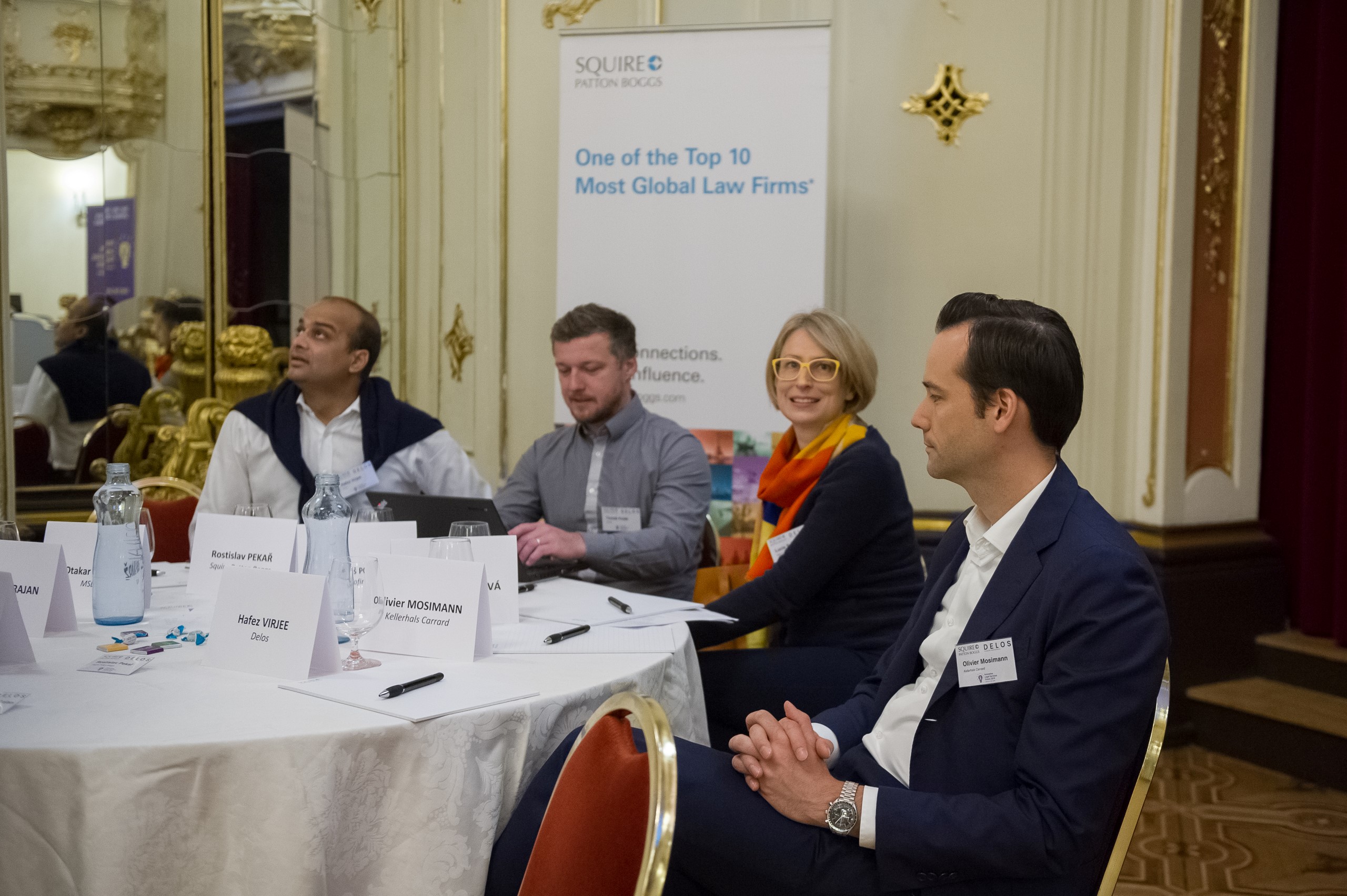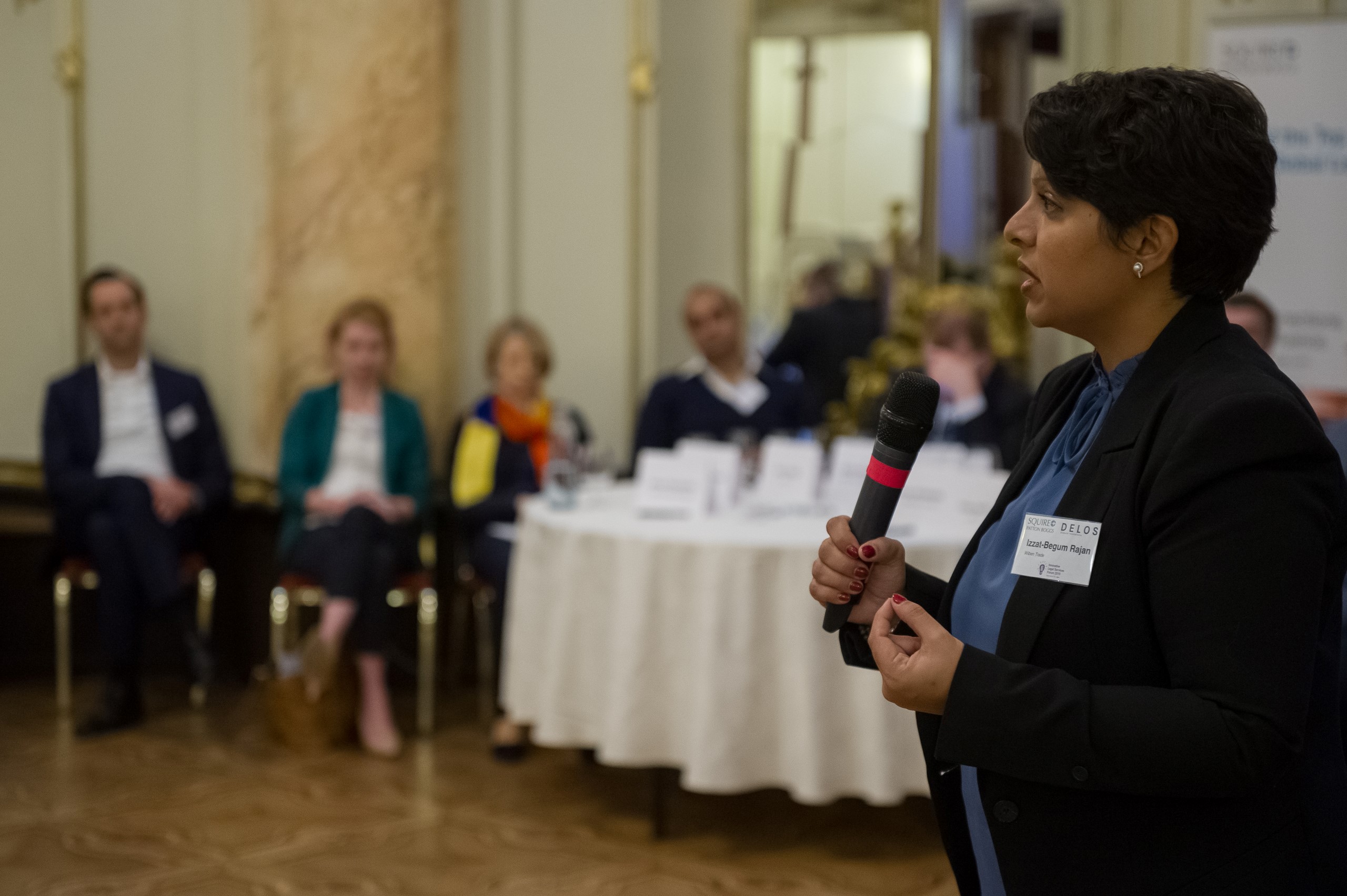Report from a Workshop Hosted by Squire Patton Boggs and Delos on 30 May 2019 in Prague
 It has been a while now that buzzword of innovation has made its way into the traditionally conservative legal world. While a number of smart tech tools for lawyers such as contract automation or document management systems with numerous integrated functionalities are already out there, a question mark arises as to whether innovative tools of this kind can ever be of major significance in dispute resolution. And with the surge of AI and the appearance of AI-based tools capable for example of identifying risk clauses in due diligence reviews or of a smart review of case-law, a new question has arisen as to whether the very process of dispute settlement can one day be driven by artificial as opposed to human—intelligence. However, as most dispute lawyers surely feel, the biggest hurdle for innovation and tech solutions in dispute resolution—and specifically in international arbitration—is that each dispute1)Save perhaps of generic disputes related to the same topic such as disputes for non-payment of utility fees and the like. has a very specific factual matrix whilst the legal arguments used by opposing sides also tend to be far from straightforward. Dispute resolution, therefore, in most cases represents a highly individualized legal field and thus prima facie does not appear as a prime candidate for commoditization towards which most current innovative legal tools are headed.
It has been a while now that buzzword of innovation has made its way into the traditionally conservative legal world. While a number of smart tech tools for lawyers such as contract automation or document management systems with numerous integrated functionalities are already out there, a question mark arises as to whether innovative tools of this kind can ever be of major significance in dispute resolution. And with the surge of AI and the appearance of AI-based tools capable for example of identifying risk clauses in due diligence reviews or of a smart review of case-law, a new question has arisen as to whether the very process of dispute settlement can one day be driven by artificial as opposed to human—intelligence. However, as most dispute lawyers surely feel, the biggest hurdle for innovation and tech solutions in dispute resolution—and specifically in international arbitration—is that each dispute1)Save perhaps of generic disputes related to the same topic such as disputes for non-payment of utility fees and the like. has a very specific factual matrix whilst the legal arguments used by opposing sides also tend to be far from straightforward. Dispute resolution, therefore, in most cases represents a highly individualized legal field and thus prima facie does not appear as a prime candidate for commoditization towards which most current innovative legal tools are headed.
It is with these wider issues in mind that Squire Patton Boggs joined forces with Delos — the arbitration institution which received the prestigious GAR Award for Innovation from 2018, in order to host a workshop titled “Innovation in dispute resolution: sci-fi or future reality?”. The ambition of the workshop was to bring legal and tech minds together to discuss whether, and if so how, dispute resolution is fit for innovation. The workshop was organized within the framework of a larger event, the Innovative Legal Services Forum held annually in Prague which has already gained a reputation for bringing together legal innovators from around the world.
The workshop was held in the morning of 30 May 2019 in a lovely setting of an art deco ballroom of the Grand Hotel Bohemia in downtown Prague, as if to somehow symbolize the clash between tradition and innovation. The event spread for three hours and included two debates focusing respectively on the “today” and the “tomorrow” of dispute resolution.
The first debate, which I had the pleasure to moderate, was centered on the status-quo of innovative techniques as applied in dispute resolution. As pointed out during the opening remarks, if the meaning of innovation is making things better, easier and more efficient, then international arbitration, in fact, represents innovation in its own right. This is because the very concept of arbitration was designed with the aim to provide a better and quicker alternative to court dispute resolution, and thanks to the miracle of the New York Convention, this concept has become both international and transnational. But even so, international arbitration has become a subject of numerous criticisms for being too expensive, too elitist and not even so quick as traditionally advertised. The question thus legitimately arises as to how innovative techniques can make arbitration more efficient, less costly and overall more accessible.
The first debate kicked off with Lucia Raimanova, counsel with Allen&Overy based in Bratislava, Slovakia. As a high-profile arbitration lawyer in a law firm which has openly embraced legal tech, Lucia offered her practical insights on a variety of tech and non-tech innovative techniques she has experienced: From AI-powered document review tools designed to make the review of huge quantities of documents quicker and thus less costly to a variety of innovative techniques relating to project management, such as flexible project-based staffing for cases enabling the involvement of non-full-time lawyers and support staff. Hafez Virjee, the president of Delos, then shared his perspective on innovation in disputes from the point of view of an arbitration institution. Hafez started off from a premise that innovation need not necessarily be just about technology; on the contrary, there are a number of non-tech innovative ideas and tools which may improve the landscape of disputes. Hafez gave an example from the Delos rules regarding registration of contracts: In everyday life, arbitrations get complicated by the fact the original contract with an arbitration clause gets lost or a dispute arises between the parties as to which version of the contract is the authentic one – and such complications occur more often than one would think. Delos thus came up with a simple idea that contracts which include a Delos arbitration clause may be registered with Delos for the purpose of a potential dispute (and if such a dispute indeed arises, it then benefits from lower arbitration fees). This simple idea indeed epitomizes the gist of true innovation: The innovative idea surely need not be complicated, but it does need to be practical and address real daily needs of dispute resolution users. Finally, Olivier Mosimann, partner with the second largest Swiss law firm Kellerhals Carrard based in Basel, offered his perspective on innovation in evidentiary matters. As he explained, efficient and persuasive presentation methods by counsel at hearings, such as augmented or virtual reality which are already being used not just in arbitration but also before courts in some countries, represent a true innovation in the presentation of evidence specifically in cases of high technical complexity where verbal or graphic presentations simply do not do enough to explain the factual issue at stake.
A lively discussion with the audience followed. Questions primarily focused on the current experience and challenges relating to the use of document review tools, specifically in the context of dispute lawyers’ willingness to entrust substantial amounts of document review work to a “machine” rather than to junior associates and the related issues of liability for error. As Lucia Raimanova pointed out, these concerns become much less relevant in a world where document review tools have a lesser probability of error than human associates.
After the break, the workshop continued with a more futuristic debate focusing on the landscape of disputes tomorrow. The panel discussion brought together tech and AI experts and lawyers and it was moderated by Rostislav Pekař, partner with Squire Patton Boggs based in Prague and the firm’s co-head of investment arbitration practice.
This round was opened by an NLP expert Otakar Smrž, a PhD holder from the Charles University in Mathematical Linguistics and a former research scientist for IBM, and who currently leads innovative efforts in MSD as an Associate Director for Emerging Technologies. Otakar gave a broad introduction of recent advances in AI and natural language processing (NLP) and elaborated on specific NLP technologies that may already have matured enough for practical utilization in dispute resolution: named entity recognition, document summarization, question answering, text classification, semantic entailment. Next to speak was Tomáš Polák, a data scientist with a Prague-based consultancy firm Profinit. Tomáš is also involved in efforts to apply AI&NLP methods to dispute resolution based on semantic entailment techniques. Tomáš dove into more concrete technical details of some NLP methods and explained the basic concepts behind neural networks. Specifically, Tomáš described how words and sentences can be turned into numbers and vectors before being processed by an NLP algorithm and illustrated it on the example of the TF-IDF (term frequency – inverse document frequency) scoring method applied to a search in a publicly available investment arbitration award. As he concluded, AI&NLP techniques have a lot to offer to dispute resolution users, for example by substantially reducing the time and costs needed to process large quantities of diverse documents. However, because each dispute is factually and legally different and thus features a specific set of documents, the development of truly efficient tools requires close cooperation between tech experts and dispute lawyers whose focused and targeted feedback is needed to properly train such tools. At least until the sci-fi idea of a universal AI tool has truly materialized. The debate was closed with the remarks of Izzat-Begum B. Rajan,  who has recently joined the Pharo Foundation as its COO in Africa. Izzat has experienced disputes from a multitude of perspectives in her rich professional life – as a lawyer, in-house counsel as well as a consultant and a certified trainer in mediation and alternative dispute resolution for the AKDN (not mentioning her black belt in judo). Izzat engaged in a lively brainstorming exercise and offered the audience several inspiring scenarios of the future of dispute resolution, including a world where the AI&NLP methods previously introduced drive us into a future where dispute resolution becomes partially or fully automated. Again, a lively discussion followed, centering primarily on sharing of visions for the future of dispute resolution.
who has recently joined the Pharo Foundation as its COO in Africa. Izzat has experienced disputes from a multitude of perspectives in her rich professional life – as a lawyer, in-house counsel as well as a consultant and a certified trainer in mediation and alternative dispute resolution for the AKDN (not mentioning her black belt in judo). Izzat engaged in a lively brainstorming exercise and offered the audience several inspiring scenarios of the future of dispute resolution, including a world where the AI&NLP methods previously introduced drive us into a future where dispute resolution becomes partially or fully automated. Again, a lively discussion followed, centering primarily on sharing of visions for the future of dispute resolution.
All in all, the workshop has made clear that innovation in disputes is not only possible, it is already happening. But it has also made clear that real innovation is not something that dispute lawyers should just observe and wait for to happen. Improving the landscape of disputes in both tech and non-tech sense requires efforts by dispute lawyers to identify real needs of dispute users, to think of simple ways to remedy existing drawbacks, and finally, to learn to speak a common language with tech experts in order to make real and full use of what tomorrow’s world can offer.
________________________
To make sure you do not miss out on regular updates from the Kluwer Arbitration Blog, please subscribe here. To submit a proposal for a blog post, please consult our Editorial Guidelines.

References
| ↑1 | Save perhaps of generic disputes related to the same topic such as disputes for non-payment of utility fees and the like. |
|---|


Maria, thank you very much for the summary of the seminar. Wish I could have attended. Seem super interesting.